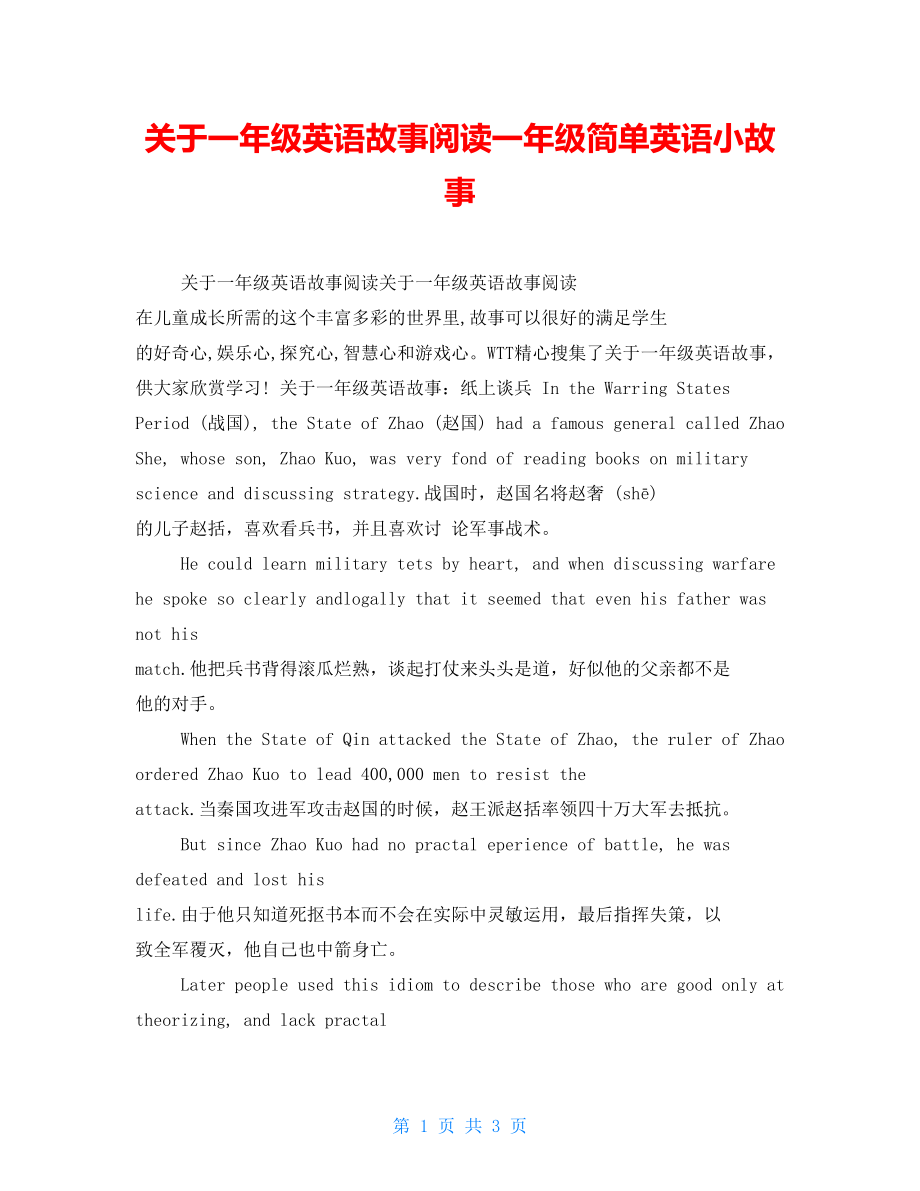《關(guān)于一年級(jí)英語(yǔ)故事閱讀一年級(jí)簡(jiǎn)單英語(yǔ)小故事》由會(huì)員分享,可在線閱讀����,更多相關(guān)《關(guān)于一年級(jí)英語(yǔ)故事閱讀一年級(jí)簡(jiǎn)單英語(yǔ)小故事(3頁(yè)珍藏版)》請(qǐng)?jiān)谘b配圖網(wǎng)上搜索��。
1�、關(guān)于一年級(jí)英語(yǔ)故事閱讀一年級(jí)簡(jiǎn)單英語(yǔ)小故事
關(guān)于一年級(jí)英語(yǔ)故事閱讀關(guān)于一年級(jí)英語(yǔ)故事閱讀 在兒童成長(zhǎng)所需的這個(gè)豐富多彩的世界里,故事可以很好的滿足學(xué)生 的好奇心,娛樂心,探究心,智慧心和游戲心�。WTT精心搜集了關(guān)于一年級(jí)英語(yǔ)故事, 供大家欣賞學(xué)習(xí)! 關(guān)于一年級(jí)英語(yǔ)故事:紙上談兵 In the Warring States Period (戰(zhàn)國(guó)), the State of Zhao (趙國(guó)) had a famous general called Zhao She, whose son, Zhao Kuo, was very fond of reading books on milita
2��、ry science and discussing strategy.戰(zhàn)國(guó)時(shí)���,趙國(guó)名將趙奢 (shē) 的兒子趙括���,喜歡看兵書,并且喜歡討 論軍事戰(zhàn)術(shù)�����。
He could learn military tets by heart, and when discussing warfare he spoke so clearly andlogally that it seemed that even his father was not his match.他把兵書背得滾瓜爛熟���,談起打仗來(lái)頭頭是道,好似他的父親都不是 他的對(duì)手�。
When the State of Qin attacked
3、 the State of Zhao, the ruler of Zhao ordered Zhao Kuo to lead 400,000 men to resist the attack.當(dāng)秦國(guó)攻進(jìn)軍攻擊趙國(guó)的時(shí)候�����,趙王派趙括率領(lǐng)四十萬(wàn)大軍去抵抗。
But since Zhao Kuo had no practal eperience of battle, he was defeated and lost his life.由于他只知道死摳書本而不會(huì)在實(shí)際中靈敏運(yùn)用�����,最后指揮失策�����,以 致全軍覆滅�����,他自己也中箭身亡��。
Later people used this idiom to d
4�、escribe those who are good only at theorizing, and lack practal eperience.最后人們根據(jù)這一歷史故事,把死摳書本�����,沒有實(shí)際經(jīng)歷��,只會(huì)夸夸 其談稱為“紙上談兵”�����。
關(guān)于一年級(jí)英語(yǔ)故事:空中樓閣 A rh man asked an architect to build a three-story house for him.有一個(gè)富人讓一位建筑師為他建造一個(gè)三層樓的房子。
When the first story was finished, the rh man said to the architect: "I wa
5��、nt only the third story;
not the first and second stories." 當(dāng)?shù)谝粚咏ㄔ旌玫臅r(shí)候�,富人對(duì)建筑師說:“我只想要第三層樓,不 要第一��、第二層����。” The architect asked, "But without the first and second stories, how can I build the third story" 建筑師說:“但沒有第一���、第二層����,何來(lái)第三層呢” Shaking his head, he packed up his things, and left.建筑師于是就搖了搖頭����,拾掇東西分開了。
Th
6�����、is idiom indates an unrealist or impractal plan or theory.這個(gè)成語(yǔ)如今比喻不現(xiàn)實(shí)或者不可行的方案或者理論等����。
關(guān)于一年級(jí)英語(yǔ)故事:猶豫不決 The "You" is a kind of wild animal whh is by nature etremely suspious.“猶”是一種野獸,它天生性情非常多疑���。
Whenever it hears a sound, it immediately bees afraid, suspecting that there is a hunternearby who is tryin
7�、g to catch it, or another animal that wants to harm it.It runs up into a tree and hides, peeking out its head and scanning all around.不管它在甚么地方找食物���,或是漫步���,一聽到聲音就害怕。它疑心有 獵人要來(lái)抓它����,或是別的野獸要來(lái)害它,就慌張地爬到樹上躲起來(lái)��。再把頭探出 來(lái)�,偷偷地看。
After a while it climbs back down, looking here and looking there.過了一會(huì)兒����,又從樹上跳下來(lái)����,在地上東張西望地看
8��、看那邊�����。
Only when it is sure that there is nothing around does it finally ben to rela.一直到什么也沒看見�����,才定下心來(lái)����。But then pretty soon, it will again grow afraid, and running up into a tree, ben the sameroutine all over again.但是過了一會(huì)兒,它又懹疑起來(lái)��,就又爬到樹上���,在樹上停一會(huì)兒�����, 定定心����,認(rèn)為沒有什么危險(xiǎn)了���,才從樹上跳下來(lái)����。
Time and time again, the "You"
9�����、repeats this, with the result that it spends half of its day running up and down trees, and wastes a lot of energy.就這樣一次又一次地跳上跳下�����,跳了大半天�,總是白費(fèi)力氣。
So, when someone is very hesitant, and cannot make a decision, others often say of this person that "the "You" cannot decide." 后來(lái)的人����,因?yàn)椤蔼q”天生好疑心,不果斷����,所以當(dāng)一個(gè)人處理事情時(shí)�����, 沒有主意�,不知道怎樣處理����,就叫做“猶豫不決”。
第 3 頁(yè) 共 3 頁(yè)
 關(guān)于一年級(jí)英語(yǔ)故事閱讀一年級(jí)簡(jiǎn)單英語(yǔ)小故事
關(guān)于一年級(jí)英語(yǔ)故事閱讀一年級(jí)簡(jiǎn)單英語(yǔ)小故事

